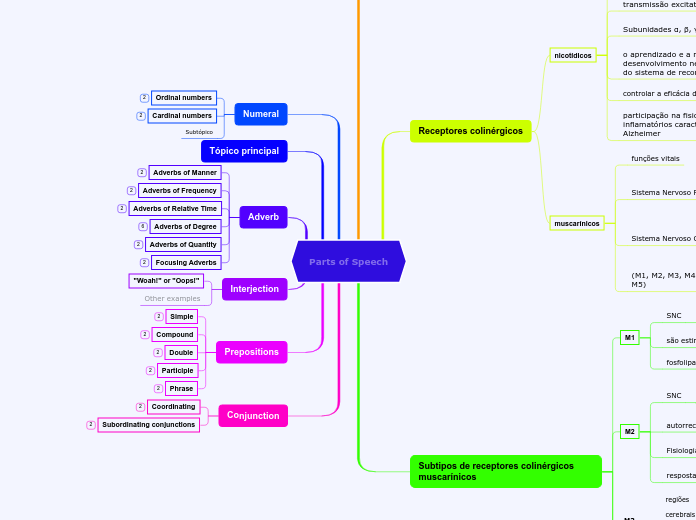по Maria Eduarda Wanderley de Barros Silva 5 лет назад
1462
SISTEMA COLINÉRGICO

по Maria Eduarda Wanderley de Barros Silva 5 лет назад
1462

Больше похоже на это
The part of speech is a category to which a word is assigned according to its syntactic functions. In English the main parts of speech are noun, pronoun, adjective, determiner, verb, adverb, preposition, conjunction, and interjection.
A conjunction is a word like 'if' 'but' or 'and' which is used to connect sentences or clauses together.
Subordinating conjunctions are conjunctions that are used at the beginning of subordinate clauses. Some examples of these conjunctions are: although, after, before, because, how, if, once, since, so that, until, unless, when etc.
Coordinating conjunctions always connect phrases, words, and clauses. They are: for, and, nor, but, or, yet, so.
A preposition is one of the most exciting parts of grammar. A preposition is used to describe the location of something in relation to something else.
A group of words used with the force of a single preposition is called phrase preposition.
Participle preposition consists of words that end in “ing”.
When a preposition consists of more than one word, it is called double preposition.
Compound preposition consists of two or more words.
When a preposition consists of one word it is called single or simple preposition.
An interjection is used to express emotion in a sentence.
Think of other interjections!
An adverb is used to describe a verb, but it can also describe an adjective or another adverb.
Adverbs normally help paint a fuller picture by describing how something happens.
The intensifiers strengthen adverbs adjectives and adverbs and down- toners make them weaker.
Fairly, Rather
Extremely, Very
A numeral is a word or phrase that describes a numerical quantity.
Some theories of grammar use the word 'numeral' to refer to cardinal numbers that act as a determiner to specify the quantity of a noun, for example the 'two' in 'two hats'.
An adjective is a word that's used to describe a specific noun and to provide more detail to the listener.
RNAm
M1+M2
formação de memória, aprendizado, o controle da função motora e o comportamento social
Superlative adjectives demonstrate a higher level of comparison between entities.
reduz a força de contração e também a frequência de batimentos cardíacos em cobaias
neurônios estriatais, no tegumento mesopontino e no núcleo motor do nervo craniano.
Expresses a comparison between two entities or groups of entities in quality or degree.
50% dos RCMs presentes no hipocampo
A noun is defined as a person, place, thing or idea. Proper nouns always begin with a capital letter. Common nouns, which are general words, such as 'cars,' are not capitalized.
Compound nouns are words where two nouns have been stuck together to make a new noun. Compound nouns should be written as one word, without a hyphen.
apenas o subtipo M5 ainda não foi totalmente caracterizado no nível farmacológico e funcional
controle da função extrapiramidal, vestibular, em funções cognitivas como memória, aprendizado e atenção, em respostas emocionais, na modulação do estresse, no sono e na vigília
ações que incluem a redução da frequência e força da contração cardíaca, o relaxamento de vasos sanguíneos periféricos e a constrição das vias respiratórias (brônquios e bronquíolos).
A noun which refers to a group of things/people.
Cérebro e tecido muscular
Cérebro= se distribuem em pré-, pós-, peri- e extrassinápticas
atividade sináptica neuronal
Sistema Nervoso Central
A verb is an action word or 'doing' word that signifies movement in some way.
A participle is a verb form that can be used as an adjective or to create a verb tense. There are two types of participles: Present participle (ending -ing) and Past participle (usually ending -ed, -d, -t, -en, or -n).
A modal is a type of auxiliary (helping) verb that is used to express: ability, possibility, permission or obligation. The main modal verbs in the English language are: can, could, may, might, must, shall, should, will, would.
A linking verb connects the subject with a word that gives information about the subject, such as a condition or relationship.
A verb with its own meaning: a verb that is not an auxiliary verb.